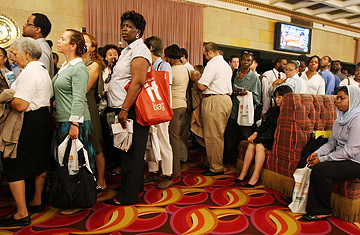
People wait to enter a diversity job fair at the Affinia Hotel in New York City on June 10
(2 of 2)
For many city managers, it's easier to justify tacking a few fresh dollars onto locals' real estate tax bills than to try and slash the padding on a fireman's health insurance plan. City workers may pay 10% to 20% of a health plan's cost, compared with 30% in the private sector, but you win few local fans when you boost the burden on a teacher or policeman to prettify the municipal bottom line.
"It's too easy for the town manager to cave," says Edholm. "There's often no downside. He's not held accountable for the profitability of a firm. He's held accountable if the streets aren't swept, the roads aren't paved or the garbage isn't picked up. It's easier to cave in to union demands than to save $9 on everyone's local tax bill, if that's what it comes down to."
Many city workers are eligible for legacy health plans that aren't available to private-sector workers in any but the ritziest of jobs. Some such plans, for instance, offer 100% coverage for basic surgeries with little if any co-pay, whereas private plans may require a $250 to $500 co-pay per surgery. In Massachusetts, for example, many local government employees enjoy benefit plans that have long since been phased out for private employees, who have seen plan standards tighten consistently in recent years. Increasingly, private sector employees across the country end up in euphemistically dubbed "consumer-directed health plans" which typically cost companies less because of higher deductibles and more restrictive care options.
Cushy government benefits are beginning to clash with the fearsome reality of explosive state and local deficits. "Towns are starting to fight back," says Edholm. "They're drowning, and they realize they have to do something about it." Many municipalities and a majority of states now face serious budget shortfalls, and declining tax revenues are likely to result from the onset of a recession. That may force some tough choices. "Falling tax receipts resulting from a steep recession could change the budgetary requirements of state and local governments," says Bos. "Whether that will have an impact on services or benefits or wages remains to be seen. It will depend on the electorate's appetite for an increase in taxes."
